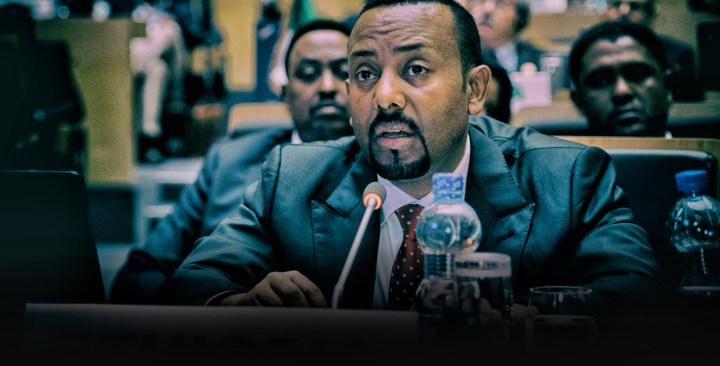ISS TODAY
Nobel gives Ethiopia’s Abiy Ahmed momentum to consolidate sustainable peace

The Nobel committee recognises all stakeholders working for peace and reconciliation in Ethiopia and the region. By Roba D Sharamo and Anton du Plessis for ISS TODAY
First published by ISS Today
The Nobel Peace Prize awarded to Ethiopia’s Prime Minister Abiy Ahmed Ali last week is a boost to reformist African leaders across the continent. It amplifies the voices of progress and reconciliation at a critical juncture for Ethiopia and the Horn of Africa region.
The award should inspire political leaders to work towards economic progress and a collective determination to transition from repression and conflict to peace and sustainable development.
Abiy, 43, still faces many daunting challenges, especially on the domestic front. But he has achieved more in a year than many African leaders have managed in decades. His Nobel is recognition of his commitment to regional peace and crucial national reforms since taking office in April 2018.
He won the prestigious peace prize for his work both at home and abroad, with the Nobel committee notably saying it recognised all stakeholders working for peace and reconciliation in Ethiopia and the region.
Abiy’s new status should inspire other African leaders. It tips the scales in favour of progressive peacemakers over ageing autocrats, and rewards reconciliation and non-violent dispute resolution over festering conflicts that drain resources and block development and pan-African cooperation. Abiy represents a new type of African leader whose ambition and innovation can help the continent deliver on its economic potential and human security promise for its people.
Abiy got the award for his efforts to achieve peace and international cooperation, in particular for his decisive initiative to resolve a long-running stalemate with neighbouring Eritrea following their 1998 – 2000 border war. He reached out to Eritrea’s president Isais Afwerki and unconditionally accepted the 2002 arbitration ruling by an international boundary commission.
This illustrated both a spirit of compromise and commitment to an international rules-based order. The Nobel committee said it hoped the award would strengthen Abiy and “help to bring about positive change for the entire populations of Ethiopia and Eritrea”.
At home Abiy has navigated challenging headwinds and still managed to promote reconciliation and social justice. He lifted Ethiopia’s state of emergency, granted amnesty to many political prisoners, reduced media censorship, dismissed some leaders suspected of corruption, reviewed the civil society organisations law, and increased the role of women in Ethiopian political life. He has pledged to hold free and fair elections and plans to open up the private sector to external firms such as in the telecommunications sector.
The committee noted that much work remains in Ethiopia, but said Abiy had started important reforms that give his people hope for a brighter future. Turning this hope into reality will however be challenging. Abiy needs to ensure that political reconciliation, management of diversity and inclusivity continue to be cornerstones of his political vision and governance.
Abiy has aided other regional peace processes too, including normalisation of diplomatic relations between Eritrea and Djibouti after many years of hostility. He has sought to mediate between Kenya and Somalia in a protracted maritime dispute, and played a key role in the process that led Sudan’s military regime and opposition back to negotiations and a new peace deal.
The Nobel committee has in the past attracted criticism for rewarding aspiration over achievement, particularly when its peace prize has gone to new leaders like Barack Obama, or to those who have not yet taken power, like Nelson Mandela.
Abiy is another early-term leader whose record is still being written. After an impressive start, he and his government still face massive challenges both at home and in the region. The peace he forged with Eritrea is tenuous, and he must contend with intractable conflicts in Somalia, Sudan and South Sudan.
At home he has created expectations in a country facing complex structural political and security problems. Ethiopia has seen recent attempted coups and assassinations of senior political and military leaders. Some regions have experienced violent ethnic conflicts, with growing demands for self-determination and political representation. Parts of the country still face humanitarian crises, with millions of internally displaced Ethiopians as well as refugees and asylum seekers from neighbouring states. These challenges will take time to address.
More than ever, Abiy is now under an African and global spotlight, and expectations on him to deliver are enormous. He needs to marshal local, regional, continental and international resources to promote peace and stability in Ethiopia and Africa at large.
Africa’s latest peace laureate needs to show that he can consolidate his vision with support from his party, the nation’s bureaucracy and its people, while engaging with political opponents. The Nobel Peace Prize gives Abiy valuable moral and political momentum to press ahead with his domestic and regional ambitions. DM
Roba D Sharamo is Regional Director, ISS Addis Ababa and Anton du Plessis, Executive Director, ISS


















 Become an Insider
Become an Insider